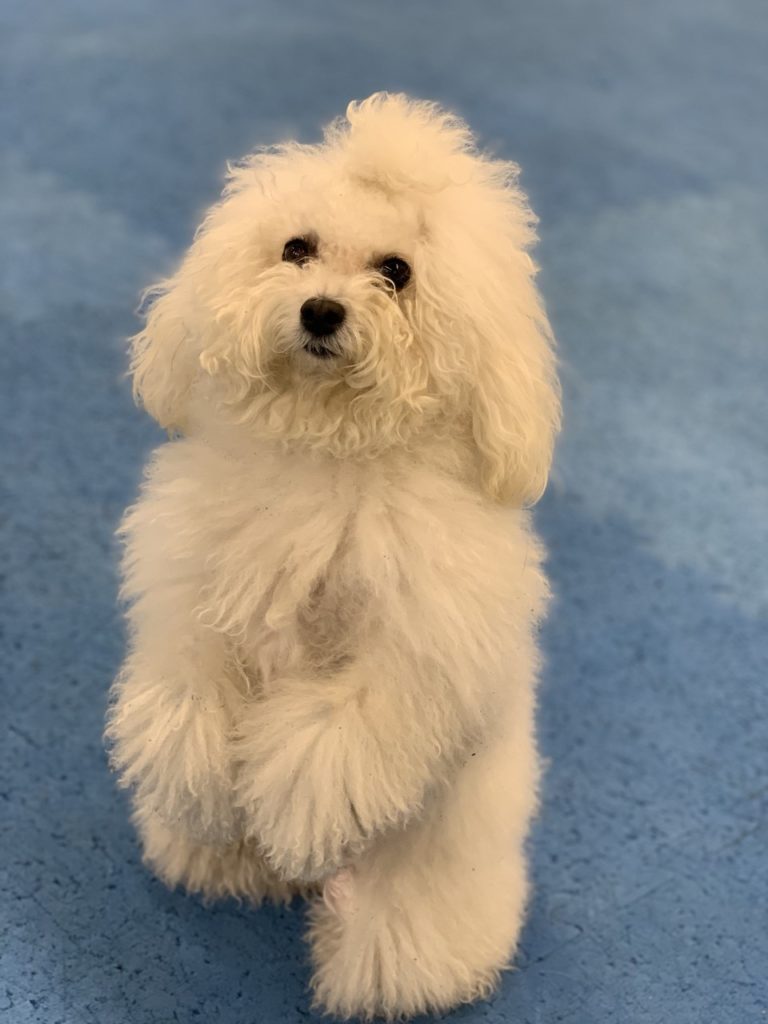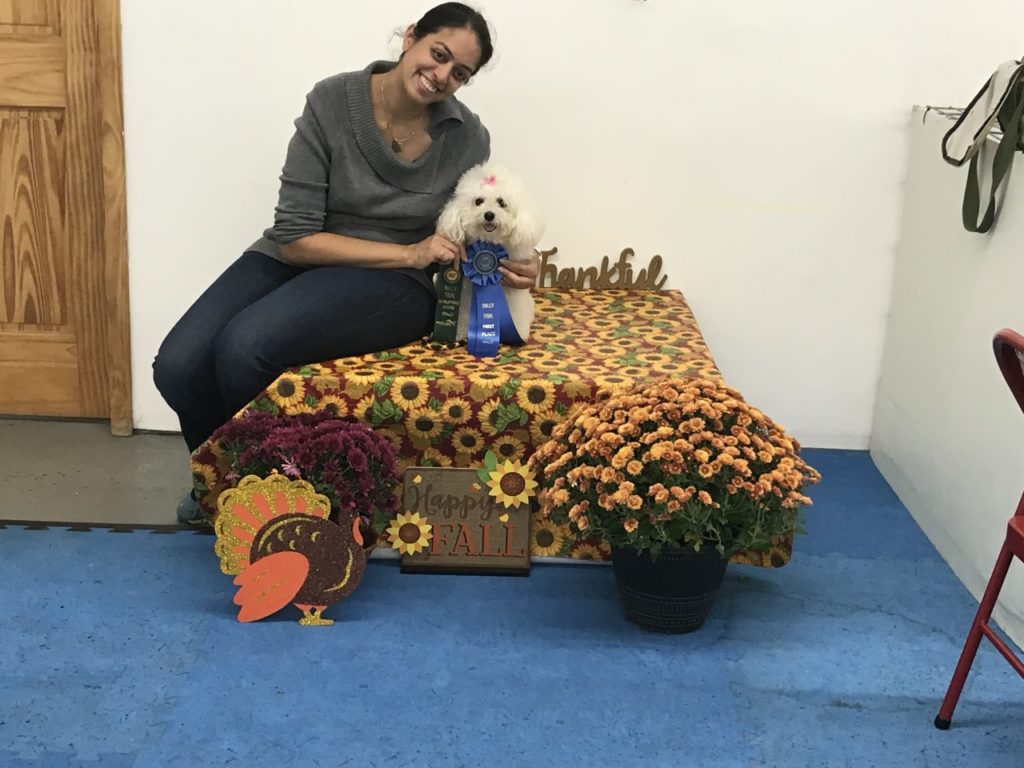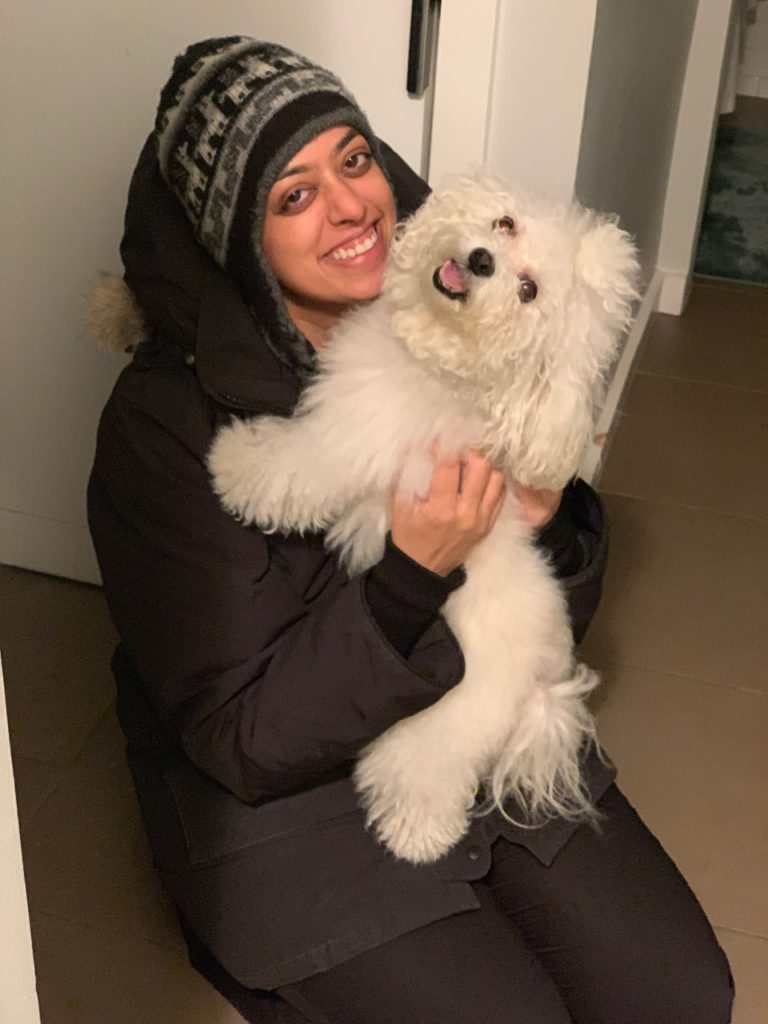
For two years and three months, Zuri was a model young dog — outgoing with zero negative reactivity.
But one day, Anita Ambani found herself with a frenetic young Bolognese and no clue what was triggering the drastic change. Add to that, Zuri is the first dog she has owned, and a non-traditional one at that.
The First Two Years
The Bolognese is a small breed of the Bichon Frise identity with Italian origins. The name refers to the Central North Italian city of Bologna. It is listed in the American Kennel Club’s Foundation Stock Service, an optional record-keeping service for all purebred breeds not currently registrable with the AKC.
Ambani is a New York City financial services program/project manager in technology (she’s moving to Columbus, Ohio this month).
When she brought Zuri home to Manhattan at eight weeks of age, the pair dove right into socialization and training. “She was such an incredible, friendly, fiercely independent, outgoing and confident puppy,” Ambani, 37, recalls. Zuri achieved multiple titles and was on her way to beginning therapy-dog training, passing evaluations in two nationally recognized programs.
She and Zuri were deeply involved in Agility and Obedience when all at once the world became a scary place for the 9-pound, white puffball.

A Sudden Change in Behavior
Suddenly, Zuri’s behavior changed. It was as if Zuri had undergone a personality transplant.
“The world became a scary place. People and dogs, even those she was friendly with, became an issue if they tried to approach her without her consent, prompting her to bark, lunge, and growl,” Ambani says. “This behavior carried on in her Agility and Obedience classes. Fearing it would worsen.”
Before getting too deep into dog sports exploration, Ambani needed answers to Zuri’s behavioral issues. During her annual checkup, a veterinarian determined she had elevated liver enzymes, which began a process of months of follow-ups with several specialists seeking to determine the cause of her liver issues. Add to that, Zuri was dealing with allergy issues. Ambani worked with practitioners at the Cornell University School of Veterinary Medicine to help formulate a home-cooked diet, which has helped significantly.
Today, Zuri is being seen by a New York City veterinary behaviorist who is establishing a modification protocol that is proving successful. “There was nothing apparent in her checkup that warranted a need to seek out a neurologist,” Ambani says.
Was there ever a pinpoint diagnosis given for her condition?
“Unfortunately, her results were inconclusive,” responds Ambani. The cause of the elevated liver enzymes were uncertain, yet it was recommended by an internist that blood work be performed every six months the remainder of her life to monitor the enzyme level.
Scent Work: The Perfect Dog Sport for Zuri?
Not content with hitting the wall in Zuri’s love affair with dog sports, Ambani researched what might fulfill this fearful, shy dog’s needs. Welcome, Scent Work. “I read about its impact on the dog’s brain along with success stories in blogs, from shut down to a new-found confidence. I had nothing to lose and everything to gain by trying this sport with Zuri,” she notes. “Zuri’s favorite pastime has always been sniffing and she loves treats.”
Ambani immediately found and signed up for a recreational Scent Work workshop offered by a local training club. In their initial session, Zuri constantly found herself looking to Ambani for direction and guidance. She didn’t fear the trainer, says the owner, but was nervous about the other dogs and random strangers. After two searches, the trainer told Ambani to let her dog do the job and to step back, listen and watch her, enabling Zuri to gain some independence.
As weeks progressed, this once skittish Bolognese began leading her through the searches with blazing speed and accuracy. “She could care less about anyone or the dogs in the room when she focused on her ‘job’ in the search area. She was in a zone and started showing drive for the first time in any sport, pulling to the start line. Zuri would sit and keep looking back to me in anticipation of hearing the words, ‘go search.’ She even began exhibiting some friendliness with other dogs and handlers in the workshop in three weeks.”

Taking the Deep Nose Dive
Once the class concluded, Ambani recognized she needed to move forward with the sport, as Zuri was hooked. Since then, they have completed an Intro to Odor and an Odor Foundation class, and they are about to start a trial prep Novice course. In addition to Scent Work, Ambani has expanded Zuri’s “Nose Work” games to Tracking. “By laying tracks and encouraging my dog to sniff outdoors, her fear reactivity to people and dogs has significantly reduced in our everyday environment.” She is now able to walk her without a muzzle on decompression walks, as she is so fixated with sniffing that she ignores owners and their dogs.
Ambani recognizes Zuri is still new to Scent Work, but she credits the inviting pathway as a foundation for the small dog’s positive change.
As an aside to the class activity, Ambani keeps Zuri motivated at home, too, with human scent detection. Following their daily morning walk and breakfast, the owner will grab a random toy, rub it with her hands and hide it and command Zuri to go find it. “She runs like crazy, uncovers the toy, runs back to the couch and drops it for another round,” smiles Ambani.
For zooming Zuri, the hunt never ends.
Following Zuri’s Nose

On a recent evening walk in Union Square Park, Zuri caught a scent and launched into a sudden work mode — nose down to the ground and heavy audible sniffing. “I didn’t want to discourage her,” Ambani laughs, “and although I didn’t have her on a tracking lead, I just decided to let her go and see where she took us. With some turns on random New York City blocks, she eventually ended up at her first puppy trainer’s apartment building and sat there at the door. “I called the trainer, who just happened to be home,” Ambani said.
“When she asked why we were at her building, I explained what Zuri did and where it led us. Turns out Zuri followed her scent to the exact turns and places she visited after working with a client in Union Square Park. We both got a laugh out of it.”
Ambani concludes, “As a first-time owner, we really beat the odds in some cases where no one, including myself to an extent, believed we would succeed. This journey is not for the faint of heart. Anyone with a reactive/aggressive dog can attest to the determination and grit you must have to simply not quit.”

